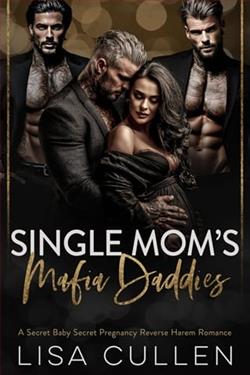Page 59 of Untouchable
How could Harp think so little of him?
Parker’s expression hardens.
“I’m not a kid, you know,” he says. “I’m an adult. And, yeah, I know I’m not very smart, but, like, I’m not a total idiot. And I wouldn’t do that. Not to anyone. And especially not to you.”
As soon as the words are out, Parker glances away, pretending to be very interested in Bo, who’s currently sniffing along the fence. He feels exposed once more, and the tiny part of his mind that’s sober—which is quiet and distant at this point—comments that he should probably talk to his supervisor about finding another massage therapist for Harp, because it’s impossible for him to just see Harp as a client anymore.
* * *
And especially not to you.
Harp realizes now that some part of him has been waiting to hear something like this—waiting to hear Parker say that Harp is special in some way. He realizes it and hates it.
The desire is always there at the back of his mind—has been since he can remember being conscious. He needs to be told, to be reassured—and yet he's never in the position to be. It's a part of himself that he's spent years trying to extinguish—and although wanting to be liked, wanting to be cared about tends to be at the back of his mind these days, the flame was never completely gone.
"I don't think that you would," Harp says, gently. What Parker has said is just enough to right himself, to get Harp thinking like a logical human being again. "You never gave me any reason to think that you would. The old paths are so well-worn in my brain that it's impossible for me not to take them sometimes—but you're right, Parker. I don't think you would do that to anyone."
* * *
Parker mullsthis over for a beat, and he calms down a little. There’s something in Harp’s voice that soothes him, as though Parker is a spooked horse, but it’s not condescending in any way. And, now that he has a moment to think about what Harp says, it does make sense.
In a way, he realizes, Parker can understand exactly what Harp means, because Parker has a similarly worn path in his brain. It goes in a different direction, but Parker recognizes it all the same. For him, it’s the flurry of anxiety when he sees his supervisor has texted him. It’s the dread when his mother starts asking him about his “plans for the future.” It’s the fear of being in trouble. It’s the awful ache that comes when he’s done something wrong, or made someone unhappy, the knowledge that he’s made the world a little worse somehow.
He can’t stop himself from making those leaps and bounds, even when he wants to stop.
Parker swallows and nods.
“I get it,” he says softly to the snow beneath his oversized boots. He registers two kinds of pain in his heart—a low, aching throb that Harp would go through life so alone, so untrusting. And another, sharper twinge at being reminded that he’s probably not any closer to really knowing Harp than he was the first day he met him. “I mean, I think, anyway.”
* * *
Parker soundswarmer now when he says I get it, but then he seems overcome with something and he turns away, facing the dogs.
He’s horrified to be trapped here with you. All he was trying to do was be friendly.
Harp doesn't know what to say. He's got no way to convince Parker that he's telling the truth now, that the question before was just a poisonous by-product of his own dumb victim mentality. Harp has essentially just said he doesn’t trust Parker.
Which... isn't true.
"Parker, I don't think you—Fuck. It wasn't easy even having someone come here who doesn't know me," Harp says to Parker’s back. He can't suppress a laugh—it's so absurd. He trusts Parker more than he's trusted anyone in Colorado, let alone anyone he's met recently, and allowed Parker more access to Harp's life than anyone who wasn't related to or married to him.
"You're the only other person who's ever even been in my bedroom for christsakes. And now you ask me to get drunk with you—which is great, I get it, that's what friends do with each other. I'm just... having a hard time adjusting to the idea of making room for a f—"
Harp feels like he's going to lose if it he can't see how Parker is reacting to his words. He’s twisting in the wind.
"Hey," Harp says gently, putting a hand on Parker's shoulder, begging him with the touch to just look back for a second, because "taking care" of Parker has been the most fun he's had in a long time, because he looks forward to seeing Parker smile, because he hates that he's already bungled something that is so important to him.
Parker turns with a questioning look and Harp isn’t sure if any of what he’s said so far has helped to mitigate the damage Harp has caused.
Cut the bullshit,he tells himself. Make a real statement without qualifying it ten different ways.
"I know I can trust you. I know you were trying to be kind. I’m rusty at having a friend."
* * *
And just like that,things are right and good again, and Parker can’t help smiling—a little hesitantly. He turns around. It’s not as though that little flare of hurt has been erased, but, when he listens to what Harp is saying, when he feels the weight of Harp’s hand on his shoulder, everything suddenly seems… inconsequential.
“So… we’re friends?” he says.















